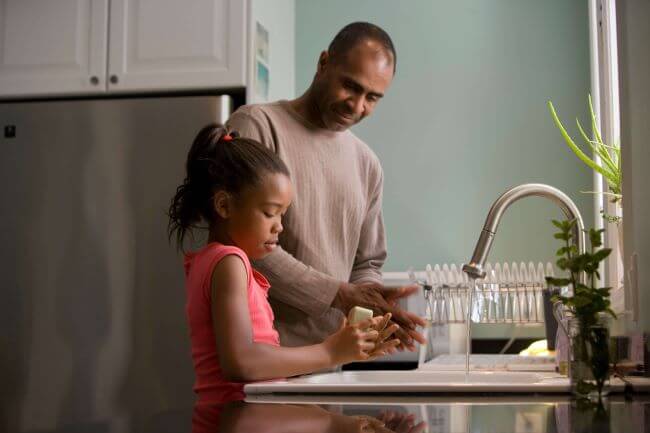How To Deal With The Relationship Between Parents And Children?
parents and children relationship
ALL TOPICS
- Parent Monitoring Tips
- Monitoring Apps
- Social Media Parental Control
Sep 11, 2024 Filed to: Parent's Guide Proven solutions
Parenting is tough and challenging, not only for children yet for parents and children. You need to know precisely how to respond to a child's speech, action, or behavior and promote their best development. Try to bring out the positivity in your children as you are the primary supports for them. To raise your children properly, you need to look upon them to have a better relationship with both of you. You might be wondering how to strengthen the relationship between parents and children, and for such frightened parents, we have the right help for you.

Can parents affect Their child?
To start with, perceive that it is typical for parents to contend or differ with one another. Notwithstanding, when parents take part in clashes with one another that are continuous, exceptional, and not settled, children do less well. Much more so if the line is about children, for instance, where children accuse themselves or feel to blame for the contentions. These negative impacts can incorporate rest aggravation and disturbed early mental health for babies, nervousness and lead issues for elementary younger students, gloom and educational issues, and other significant issues, such as self-hurt, for more seasoned children teenagers.

It is usual for parents to feel worried about the effect their contentions may have on their children. Be that as it may, it isn't unexpected to contend or differ at times, and indeed, children react well when parents clarify or resolve; in a proper way or what a contention was about.
In reality, where parents effectively resolve conflicts, children can learn positive critical exercises to explore their feelings and connections past the family circle. Assisting parents with seeing how their relationships influence children's improvement makes way for responsible children today - and sound families later on.
How should parents treat their children?
Quality time can happen whenever and anyplace, in the center of ordinary days and circumstances. It very well may be a shared snicker when you're washing your baby or a decent discussion in the vehicle with your young kid. These minutes allow you to discuss positive messages with grins, giggling, eye to eye connection, embraces, and soft contacts.
You can take advantage of the time together by limiting disturbances and interruptions. It can be as simple as taking care of your telephone. It helps your kid realize that you're truly quick to invest continuous energy with them. There may be occasions in your day-to-day life when it's unrealistic to have a ton of time with your kid each day. Be that as it may, arranging some customary one-on-one time with your child can help you make the most of the time.

In the early years with your child, creating trust is significant. Your child will have a sense of safety when they learn they can confide in you to address their issues. This feeling of well-being and security gives your child the certainty to investigate the world.
You can sustain trust and regard in your relationship. For instance:
1. Be accessible when your child needs backing, care, or help. It may be getting your baby when they fall or getting your young child when they call you after a gathering. It encourages your child to figure out how to believe that you'll be there when they need you.
2. Stick to your guarantees, so your kid figures out how to believe what you say. For instance, on the off chance that you guarantee that you'll go to a school movement, do all you can to arrive.
3. Please get to know your kid and worth them for what their identity is. On the off chance that your kid loves football, cheer your child on or get some information about the best players. Indicating regard for your child's emotions and sentiments urges your kid to continue imparting them to you.

4. When your kid communicates an alternate assessment from yours, tune in without judging or getting vexed. It sends the message that you'll tune in and help your kid with troublesome issues or circumstances later on.
5. Allow the relationship to advance as your child creates, and your child's necessities and interests change. For instance, your pre-adolescent kid may at this point don't need you around at the recreation center with their companions, even though your kid used to cherish playing there with you.
6. Set up some firm yet reasonable family runs the show. Rules are clear articulations about how your family needs to care for and treat its individuals. They can help your child believe that you'll be steady in the manner you treat them.
What does a child need from a parent?
It is simple for parents to distinguish their child's actual requirements: nutritious food, comfortable garments when it's cool, sleep time at a reasonable hour.

Nonetheless, a child's psychological and feelings may not be as self-evident. Great psychological well-being permits children to think unmistakably, grow socially, and learn new abilities. Childs learn and grow best when they have reliable, cherishing, positive associations with Parents. That is because positive associations with parents help children understand the world.
Regardless of whether the world is free from any danger, whether they're cherished, who loves them, what happens when they cry, snicker or grimace and considerably more.
You can build a positive relationship between parents and kids by:
- spending time with your child.
- Creating a mindful climate of trust and regard.
- Spreading positivity.

Once in a while, parents accidentally pass up open doors for closeness by not permitting their children to assist them with different undertakings and errands. Dumping food supplies after going to the store is a genuine illustration of something that the offspring of most ages can and should help with. Kids feel incredible when they help.5 Children can likewise help by offering thoughts. Asking a kid which shoes look better with your dress tells him you esteem his assessment. If you request, be set up to acknowledge and live with the kid's decision.
What role do parents play in child development?
As children create from babies to adolescents to grown-ups, they experience a progression of formative stages that are critical to all parts of their personhood, including physical, scholarly, enthusiastic, and social. The parent's best possible function is to give consolation, backing, and admittance to exercises that empower the child to dominate key formative assignments.

A parent is their child's first educator and ought to remain their best instructor all through life. Working as a mentor, the parent opens a kid to age-suitable difficulties to energize advancement, just as encounters permit them to investigate all alone and gain from interfacing with their current circumstance. Parents and kids need to be best friends to remain in a constant intense communicative relationship.
What is FamiSafe, and how can it help in this regard?
In this regard, spending time with children has become more creative. FamiSafehas brought you all the entertainment for families, along with security and parental control. You can now easily watch favorite shows with your child and help them see educational shows and seasons by limiting screen time.
- Web Filter & SafeSearch
- Screen Time Limit & Schedule
- Location Tracking & Driving Report
- App Blocker & App Activity Tracker
- YouTube History Monitor & Video Blocker
- Social Media Texts & Porn Images Alerts
- Works on Mac, Windows, Android, iOS, Kindle Fire
Moreover, parents can prevent children from inappropriate content on the web nowadays with the help of FamiSafe. It can be the best approach for you to spend time with your kids.
Parenting is the most satisfying position that we will have. However, it's not without its difficulties. Present-day to day life can be distressing, and with different weights on families, it's not in every case simple. Eventually, parents need what is best for their kid, and a stable parent-youngster relationship can assist lead with bettering results for kids.

Thomas Jones
chief Editor